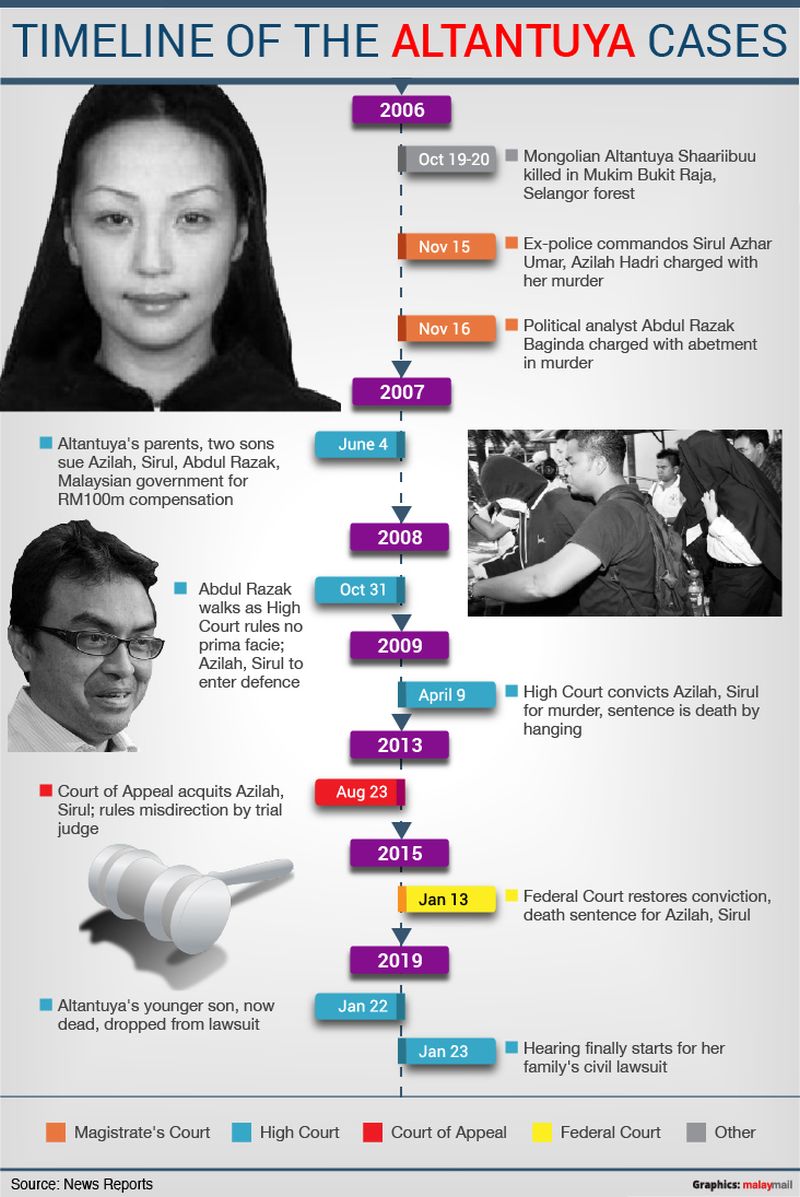- Former police commando Azilah Hadri’s death sentence for the 2006 murder of Altantuya Shaariibuu was commuted to 40 years in prison and 12 strokes of the cane by the Federal Court.
- The Federal Court’s decision, chaired by Chief Justice Tun Tengku Maimun Tuan Mat, reviewed Azilah’s sentence under Malaysia’s new sentencing laws, but did not revisit his murder conviction.
- Azilah’s lawyers presented mitigating factors, including a letter from Altantuya’s father supporting the reduced sentence, and claimed Azilah was following orders from then-deputy prime minister Datuk Seri Najib Razak.
- The earliest Azilah could be released from prison, based on good behaviour, is 2034, when he will be 58 years old.
PUTRAJAYA, Oct 10 — Former police commando Azilah Hadri will no longer have to face the death penalty over Mongolian model Altantuya Shaariibuu’s 2006 murder, as the Federal Court has decided to reduce or replace his sentence with imprisonment of 40 years and 12 strokes of the cane.
Chief Justice Tun Tengku Maimun Tuan Mat, who chaired the Federal Court’s three-judge panel, delivered the panel’s unanimous decision to allow Azilah’s application to commute his death sentence to jail time and caning instead.
“We set aside the death sentence and substitute it with imprisonment for 40 years from the date of arrest, November 1, 2006, excluding the period the applicant was released by the Court of Appeal and 12 strokes,” she said after the panel left the courtroom for about 42 minutes to deliberate on the decision.
Earlier in her brief decision, Tengku Maimun made it clear that the Federal Court’s decision today is not a review of Azilah’s conviction of Altantuya’s murder.
Instead, the judge said the Federal Court was only exercising its discretion in reviewing Azilah’s death sentence in line with Act 847 — or the law known as the Revision of Sentence of Death and Imprisonment for Natural Life (Temporary Jurisdiction of the Federal Court) Act 2023.
Azilah’s lawyers had presented two documents to the Federal Court: a letter from Altantuya’s father Shaariibuu Setev which supported the replacing of Azilah’s death sentence with imprisonment; and Azilah’s supplementary affidavit for his application for his death sentence to be commuted.
Azilah’s supplementary affidavit had included his entire 2019 statutory declaration claiming to have received instructions from then deputy prime minister Datuk Seri Najib Razak for Altantuya’s 2006 murder.
In delivering the Federal Court’s decision, Tengku Maimun said the prosecution had not challenged the two documents presented by Azilah’s lawyers, and said Azilah’s additional affidavit provides a “strong mitigating factor” and reason for the Federal Court to exercise its discretion in favour of Azilah.
She also said Azilah’s additional affidavit provides grounds for the Federal Court to apply the principle of proportionality in deciding the sentence that should be imposed on Azilah.
After also noting the letter from the “victim’s father” which supported Azilah’s application for the death sentence to be reduced to imprisonment, Tengku Maimun then said the Federal Court allowed the replacement of the death sentence with imprisonment and caning for Azilah.
The other two judges on the Federal Court panel are President of the Court of Appeal Datuk Abang Iskandar Abang Hashim and Federal Court judge Datuk Nordin Hassan.
Following the Federal Court’s decision, Azilah’s lawyers J Kuldeep Kumar and Athari Bahardin confirmed to reporters that the earliest that their client can expect to be released from prison is in 2034.
This calculation is based on Azilah’s lawyers taking into account the typical one-third remission or reduction of jail term for prisoners on good behaviour, and also the 16 years and three months that Azilah had already spent in jail since his November 1, 2006 arrest; and also, after excluding a period of one year and four months during 2013 to 2015 when Azilah was acquitted by the Court of Appeal.
Azilah will be 58 years old in 2034.
Azilah, now 48, has been on the death row in prison for the past nine years, after the Federal Court in 2015 decided to uphold his conviction.
Azilah was aged 30 and the chief inspector with the police’s special action unit (UTK) when he was charged in 2006 with the murder, and was aged 39 when the Federal Court decided that both he and fellow police commando Sirul Azhar Umar are guilty of the crime.
At the time of Azilah’s conviction for murdering Altantuya, the punishment under the Penal Code’s Section 302 was a mandatory death sentence. This means the courts had no discretion to hand down alternative sentences.
After Malaysia changed its laws last year, the courts can now choose to decide whether to sentence a person who committed murder with either the death penalty; or between 30 to 40 years of jail and at least 12 strokes of the cane.
Following the changes to Malaysian law, prisoners in Malaysia who were sentenced to death for murder — including Azilah — had applied to the Federal Court to review their sentences and to consider replacing it with a minimum 30-year imprisonment and caning.

What Azilah and the prosecution argued
Besides reading out Altantuya’s father’s letter to the Federal Court, Azilah’s lawyer Kuldeep this morning listed mitigating factors that the court should consider, including his Sarawak-born client’s upbringing where he came from a family of hardship and was a good student.
Kuldeep also noted that his client had took on various public duties in the past while with the police’s UTK, including escorting and ensuring the security of VIPs and VVIPs such as the Yang di-Pertuan Agong, then prime ministers Tun Dr Mahathir Mohamad and Tun Abdullah Badawi and then deputy prime minister Datuk Seri Najib Razak, and heads of states such as Russia’s Vladimir Putin and the late Saudi ruler King Abdullah.
Kuldeep also cited certificates of appreciation signed by Dr Mahathir and one such certificate signed by then inspector-general of police Tan Sri Mohd Bakri Omar in 2005 over Azilah’s service, while also noting Azilah’s other achievements when he was serving in the police force.
“It is our humble submission, this is not a criminal killer, he is not a criminal, ordinary murderer. He is not a criminal, he has no propensities to commit crimes. The applicant has on numerous occasions conveyed his deep regret on this tragic event that has led to loss of an innocent woman’s life,” he argued.
Kuldeep argued that Azilah would not be a “threat to society” if his death sentence is reduced to imprisonment and whipping and after he serves his sentence, noting that Azilah had dutifully attended the Federal Court hearings and also the Federal Court proceeding in 2015 when it delivered its decision to uphold his conviction and death sentence.
“It is undisputed that the murder of Altantuya Shaariibuu was not for purposes of sexual gratification nor was it a hired assassination job. Also no evidence to show he was a serial killer, hired assassin, and he did not benefit monetarily and had no benefit in killing. The prosecution failed during trial to prove any motive on that,” he argued.
Kuldeep argued that his client had no connection at all to Altantuya and had no motive to kill this woman who was a “complete stranger” to him.
Citing Azilah’s 2019 statutory declaration, Kuldeep said that his client had claimed to have been informed by then deputy prime minister Najib and his aide de camp DSP Musa Safri that Altantuya was a foreign spy who exposes national secrets and that was why he had carried out what he believed to be a covert operation to safeguard national secrets.
Kuldeep said police officers are trained to carry out instructions from their superiors and the statutory declaration shows Azilah’s “state of mind” when he committed the murder, and that his client had not raised this in trial previously as he was told he could not disclose this covert operation.
He argued his client should be spared from the gallows to enable him to be rehabilitated and be allowed to return to society.
Kuldeep also argued that the sentence imposed on his client should be proportionate, as the prosecution did not file an appeal when the High Court acquitted political analyst Abdul Razak Baginda—who was charged with abetting the murder—without calling for him to enter defence. Kuldeep said Abdul Razak was however found liable for RM5 million in compensation together with others in a civil lawsuit by Altantuya’s family on the same facts.
Also when arguing on the need for proportionality in sentencing, Kuldeep highlighted that the Australia-based Sirul had taken advantage of the system and is now a “free man” there.
“If the death sentence is given to Azilah alone, he will be the only man put to death. And that would also mean, Australian laws, the authorities and police will never be able to bring Sirul back to face justice. Sirul will walk away as a free man,” he argued.
Deputy public prosecutor Datuk Mohd Dusuki Mokhtar, who is also the head of the Attorney General’s Chambers’ appellate and trial division, argued that “public interest” should be the most important factor when the court sentences a convicted person.
“This case has shocked the conscience of our community. The way it was committed, in a gruesome manner, the victim was shot and then blown up in pieces, has shown the gravity of the offence, where it has also shown the gruesomeness without due regard of life of human being,” he argued, adding that the “brutal” murder had also attracted a lot of attention and that Altantuya was a foreign citizen.
While acknowledging that Kuldeep’s argument of Azilah following orders as a police officer as trained could be a possible mitigating factor, Dusuki stressed that public interest in this case should override the fact that he was implementing orders from his higher ups.
Dusuki said the way the murder was carried out showed that Azilah had a guilty mind when executing the murder, and that he should have made some inquiries first instead of immediately carrying out the murder on the pretext that Altantuya was allegedly a foreign spy.
When responding to Kuldeep’s arguments about Sirul, Dusuki said the procedure applicable in Malaysia has to be followed and the fact that Azilah is in Malaysia now cannot be avoided, and left it to the court to balance the facts against the public interest.
“Only Azilah is now before this court, so I can’t in fact comment on the other party or the other accused person who is now in Australia. But we got to deal with this case first, and maybe other forum we can deal with other issues. Maybe in other times, maybe in some other times,” he said.
After emphasising that public interest should be the most important factor, he then left it to the Federal Court to decide on Azilah’s sentence.

Recommended read:
- Lawyer: Azilah 'relieved' to no longer face death over Altantuya's murder; 2034 is earliest release from 40-year jail time
- Altantuya’s father backs his daughter’s convicted killer Azilah’s bid to replace death sentence with jail time, caning
- Altantuya was murdered 18 years ago — Here’s what happened since






















